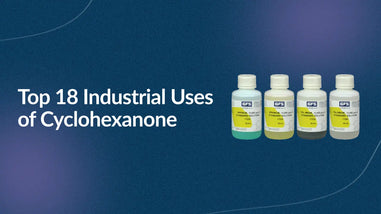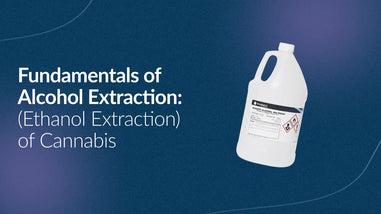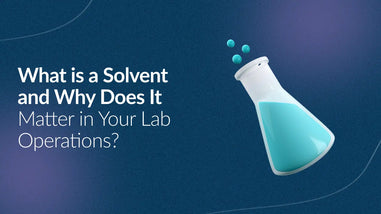- No products in the cart.
Acids are critical in a wide range of laboratory applications, from simple experiments to complex industrial processes. For instance, sulfuric acid, the most widely produced industrial acid, had an estimated global production of 260 million tonnes, with about 60% used in fertilizer manufacturing.
Understanding how to name acids is essential in every chemical process. Whether you're working in a biomedical lab or a chemical manufacturing plant, understanding how to name and work with acids is essential.
Lab Pro provides high-quality acids and chemicals for laboratories in California and worldwide, ensuring the highest standard of materials for your experiments.
Key Takeaways:
-
Understand the basic rules for naming acids based on the anion they are paired with.
-
Hydrochloric acid, sulfuric acid, and nitrous acid are widely used in chemical and industrial applications.
-
Acids must be electrically neutral, meaning the hydrogen ions balance the negative charge of the anion.
-
Knowing how to name acids and write their formulas is essential for preparing accurate chemical solutions.
-
Natural acids such as citric acid and acetic acid are commonly found in food and laboratory applications.
What Is An Acid?
An acid is a molecular compound containing at least one hydrogen atom that, when dissolved in water, produces hydrogen ions (H+).
Acids are central to countless chemical reactions, particularly in biomedical research, manufacturing, and chemical processing.
In a laboratory, understanding the type of acid you are working with is essential for both safety and accuracy in experiments.
3 Key Rules For Naming Acids
Naming acids is based on the anion (the negatively charged ion) attached to the hydrogen atom.
The rules are simple but crucial for accurate chemical identification and understanding how to name acids:
-
Anions Ending in "ide":
Rule: The acid name starts with "hydro," followed by the root of the anion, and then the suffix "-ic." -
Example: Hydrochloric acid (HCl)
-
Lab Relevance: Common in chemical manufacturing, hydrochloric acid is essential for the production of organic compounds used in fertilizers and many laboratory reagents. Lab Pro’s hydrochloric acid meets the high purity standards required in industrial labs.
-
Anions Ending in "ate":
Rule: The acid name takes the root of the anion, followed by "-ic" without any prefix. -
Example: Sulfuric acid (H₂SO₄)
-
Lab Relevance: Widely used in wastewater treatment and chemical synthesis. At Lab Pro, we provide sulfuric acid ideal for a range of industrial applications, from pH regulation to chemical synthesis.
-
Anions Ending in "ite":
Rule: The acid name uses the root of the anion followed by "-ous." -
Example: Nitrous acid (HNO₂)
-
Lab Relevance: Important in chemical reactions where a lower oxidation state of nitrogen is required. Lab Pro’s nitrous acid can be sourced for precise chemical applications in lab settings.
Also Read:
Writing Formulas For Acids
When writing formulas for acids, remember that acids must be electrically neutral. The positive charge of hydrogen ions (H+) balances out the negative charge of the anion. For example, hydrochloric acid (HCl) consists of one hydrogen ion and one chloride ion (Cl⁻), balancing the positive and negative charges.
Understanding this concept is essential when preparing chemical solutions or ensuring accurate pH levels in lab experiments.
Understanding how to name acids and writing their formulas correctly is essential when preparing chemical solutions or ensuring accurate pH levels in lab experiments.

Common Acids In Industry And Research
Several acids are essential in industrial and research settings. Here are four commonly used acids, all of which are available at Lab Pro for your lab’s needs:
1. Nitric Acid (HNO₃):
Used in food sterilization and chemical manufacturing, it also serves in the production of fertilizers and explosives.
Lab Pro Supply: Available in high-purity grades for industrial applications.

A versatile acid for making organic compounds in fertilizers and used in cleaning and metal refining.
Lab Pro Supply: Available in various concentrations for your specific needs.

A key reagent in wastewater treatment, petroleum refining, and as a catalyst in chemical processes.
Lab Pro Supply: Available in certified grades for industrial use, ideal for various chemical applications.

Widely used in electronics and glass etching, HF plays a vital role in manufacturing fluoropolymers.
Lab Pro Supply: Available with detailed safety and handling instructions for safe lab use.
Acids Found In Nature
Natural acids are present in various substances, including fruits, vegetables, and even the human body. These acids can play a role in both research and industrial processes, such as food chemistry or natural product synthesis:
Citric Acid:
The global production of citric acid reached 2.81 million tonnes last year.
Citric acid, found in citrus fruits like lemons and limes, is often used in pH adjustment and preservation in food processing.
Acetic Acid:
The main component of vinegar, acetic acid has wide applications in food industries and as a solvent in laboratory experiments.
Oxalic Acid:
Present in plants like spinach and rhubarb, oxalic acid is useful in chemistry labs for titration experiments.

Putting Acid Naming Knowledge Into Practice
Mastering the rules of naming and working with acids is fundamental for any laboratory professional. Whether you're handling common industrial acids or exploring organic acids in research, having access to the right chemicals and reagents is essential.
At Lab Pro, we provide a complete selection of acids and related products, including:
1. ACS Reagent Grade Acids – High-purity standards for analytical and research use.
2. Organic Acids – Essential for biochemical, pharmaceutical, and industrial applications.
3. Trace Metal Acids – Specialized formulations for trace analysis and sensitive testing.
4. Non-Aqueous Acids – Solutions designed for non-water-based reactions.
5. Bases – Reliable chemical bases to complement acid-related experiments.
Lab Pro ensures your lab has everything it needs for accurate, compliant, and efficient experiments. Explore our product catalog for the highest-quality acids and chemicals, or contact our experts for tailored recommendations.
Need reliable acids for your next experiment?
Explore our product catalog for the highest-quality acids and chemicals.
FAQs
1. How do I determine the formula of an acid?
To write the formula of an acid, balance the positive charge of hydrogen ions (H⁺) with the negative charge of the anion. For example, in hydrochloric acid (HCl), the one hydrogen ion (H⁺) balances with the chloride ion (Cl⁻), making the compound electrically neutral and ensuring correct chemical balance.
2. What is the difference between acids ending in 'ite' and 'ate'?
Acids with anions ending in "ite" are named with the suffix "-ous," whereas those with anions ending in "ate" are named with "-ic." For example, nitrous acid (HNO₂) has the "-ous" suffix, while sulfuric acid (H₂SO₄) has the "-ic" suffix, reflecting the oxidation states of the anions.
Understanding how to name acids based on these endings is key to correct acid identification.
3. Why are acids important in industrial applications?
Acids play a crucial role in various industrial processes such as cleaning, chemical manufacturing, and wastewater treatment. For example, sulfuric acid is used in petroleum refining, while hydrochloric acid aids in metal refining. Their ability to break down and process materials makes them vital in large-scale industrial operations.
4. Can I use natural acids in laboratory experiments?
Yes, natural acids such as citric acid, acetic acid, and oxalic acid are commonly used in research labs. These acids are found in everyday substances like fruits and vinegar and are useful in food chemistry, pH adjustments, and titration experiments, providing practical applications in laboratory settings. Knowing how to name acids helps ensure they are used properly in laboratory settings.












































